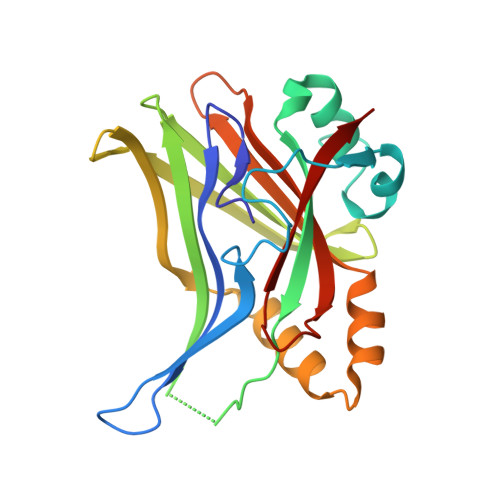MoA Studies of the TEAD P-Site Binding Ligand MSC-4106 and Its Optimization to TEAD1-Selective Amide M3686.
Heinrich, T., Schwarz, D., Petersson, C., Gunera, J., Garg, S., Schneider, R., Keil, M., Grimmeisen, L., Unzue Lopez, A., Albers, L., Schlesiger, S., Gambardella, A., Bomke, J., Carswell, E., Schilke, H., Diehl, P., Doerfel, B., Musil, D., Trivier, E., Broome, R., Marshall, S., Balsiger, A., Friedrich, E., Lemos, A.R., Santos, S.P., Sousa, P.M.F., Freire, F., Bandeiras, T.M., Bortoluzzi, A., Wienke, D.(2025) J Med Chem 68: 6149-6164
- PubMed: 39704449
- DOI: https://doi.org/10.1021/acs.jmedchem.4c01949
- Primary Citation of Related Structures:
9GAX - PubMed Abstract:
Taking the structural information into account, we were able to tune the TEAD selectivity for a specific chemotype. However, different TEAD selectivity profiles did not affect the compound potency or efficacy in the NCI-H226 viability assay. Amides based on MSC-4106 or analogues showed improved viability efficacy compared with the corresponding acids. The amide M3686 exhibited AUC-driven efficacy in NCI-H226 xenograft models and had an improved 25-fold lower human dose prediction than MSC-4106 . MSC-4106 was also used in HDX-MS studies to aid in the understanding of the MoA of P-site binding TEAD inhibitors. Artificial P-site binders rigidify certain areas in the periphery of the transcription factor that seem to be crucial for cofactor interaction, whereas a native fatty acid increased the protein dynamics of cofactor-binding interfaces.
- Merck Healthcare KGaA, Frankfurter Str. 250, 64293 Darmstadt, Germany.
Organizational Affiliation:



















